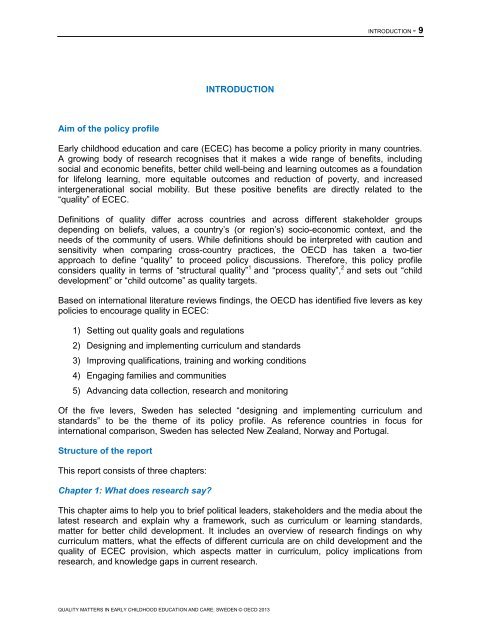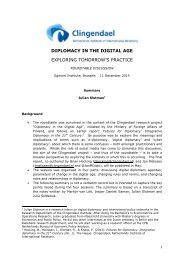SWEDEN%20policy%20profile%20-%20published%2005-02-2013
SWEDEN%20policy%20profile%20-%20published%2005-02-2013
SWEDEN%20policy%20profile%20-%20published%2005-02-2013
Create successful ePaper yourself
Turn your PDF publications into a flip-book with our unique Google optimized e-Paper software.
Aim of the policy profile<br />
INTRODUCTION<br />
QUALITY MATTERS IN EARLY CHILDHOOD EDUCATION AND CARE: SWEDEN © OECD <strong>2013</strong><br />
INTRODUCTION - 9<br />
Early childhood education and care (ECEC) has become a policy priority in many countries.<br />
A growing body of research recognises that it makes a wide range of benefits, including<br />
social and economic benefits, better child well-being and learning outcomes as a foundation<br />
for lifelong learning, more equitable outcomes and reduction of poverty, and increased<br />
intergenerational social mobility. But these positive benefits are directly related to the<br />
“quality” of ECEC.<br />
Definitions of quality differ across countries and across different stakeholder groups<br />
depending on beliefs, values, a country’s (or region’s) socio-economic context, and the<br />
needs of the community of users. While definitions should be interpreted with caution and<br />
sensitivity when comparing cross-country practices, the OECD has taken a two-tier<br />
approach to define “quality” to proceed policy discussions. Therefore, this policy profile<br />
considers quality in terms of “structural quality” 1 and “process quality”, 2 and sets out “child<br />
development” or “child outcome” as quality targets.<br />
Based on international literature reviews findings, the OECD has identified five levers as key<br />
policies to encourage quality in ECEC:<br />
1) Setting out quality goals and regulations<br />
2) Designing and implementing curriculum and standards<br />
3) Improving qualifications, training and working conditions<br />
4) Engaging families and communities<br />
5) Advancing data collection, research and monitoring<br />
Of the five levers, Sweden has selected “designing and implementing curriculum and<br />
standards” to be the theme of its policy profile. As reference countries in focus for<br />
international comparison, Sweden has selected New Zealand, Norway and Portugal.<br />
Structure of the report<br />
This report consists of three chapters:<br />
Chapter 1: What does research say?<br />
This chapter aims to help you to brief political leaders, stakeholders and the media about the<br />
latest research and explain why a framework, such as curriculum or learning standards,<br />
matter for better child development. It includes an overview of research findings on why<br />
curriculum matters, what the effects of different curricula are on child development and the<br />
quality of ECEC provision, which aspects matter in curriculum, policy implications from<br />
research, and knowledge gaps in current research.








